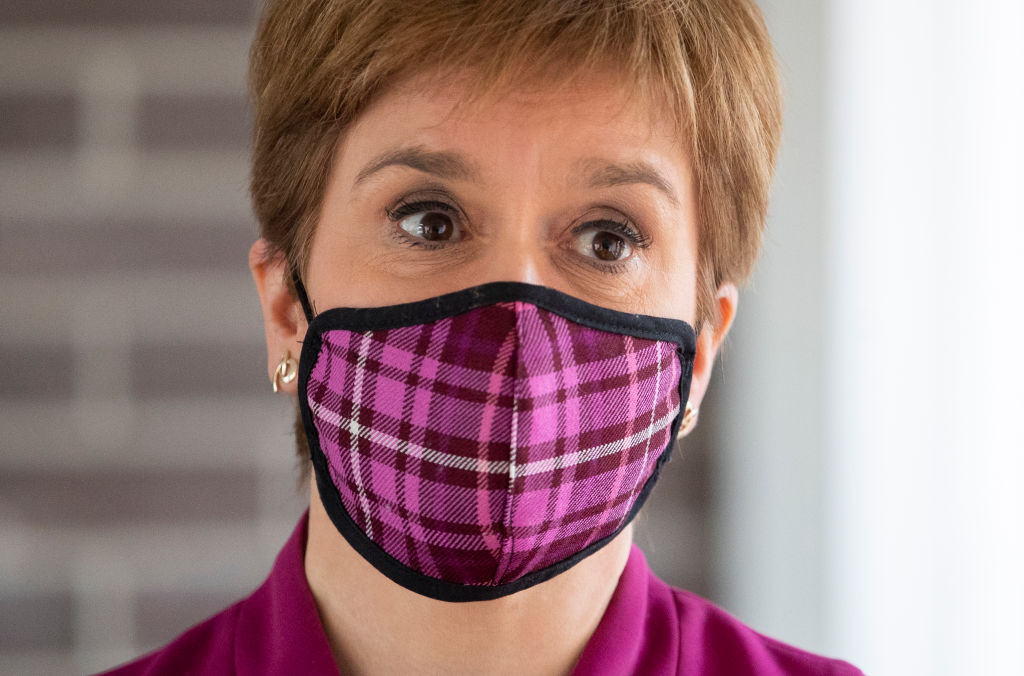Don’t worry if you missed the press release announcing which Scottish taxes are going up to pay for Nicola Sturgeon’s headline grabbing four per cent minimum pay rise offer for certain front-line healthcare workers, including nurses. You missed it because there wasn’t one.
In characteristically hubristic form, the Scottish Government made the announcement just a few hours before the pre-election ‘purdah’ period began, with Sturgeon immediately taking to Twitter to declare:
‘Our NHS staff deserve more than applause and one per cent is not enough’.
It was a thinly-veiled dig at the offer Boris Johnson’s administration has put forward in England.
Normally when a government makes an announcement like this the immediate question is: where is the money coming from? Cuts elsewhere, perhaps? Tax rises? Extra borrowing?
The announcements are a microcosm of the SNP’s years in power
In this case there is no need to ask. The Scottish Government has had so much money flowing into its coffers over the last 12 months – and Covid-19 spending announcements have been so ubiquitous and complex – that it has had more than enough cover and flexibility to organise a big pre-election giveaway with the resources at its disposal.
A February report from Audit Scotland, the official auditor of public spending, outlined how murky the financing picture has become in Scotland. Over 170 Covid-19 related spending announcements had been made at that point. These are in addition to UK Government spending commitments that apply to Scotland, such as furlough support. In a statement entitled Transparency needed to follow pandemic pound that was put out alongside the report, Scotland’s Auditor General Stephen Boyle warned it is ‘getting harder to identify what is, and isn’t, Covid-19 spending’.
Still, some interesting numbers came out in the report. The Scottish Government received £9.7 billion of additional funding to the Scottish budget in the year 2020-21 via the Barnett formula, the mechanism by which the Treasury allocates block grants to devolved administrations. But only £7 billion worth of spending announcements had been allocated in response to the pandemic.
What’s more, the report also noted that the Scottish Government ‘has decided to carry forward the most recent announcement of Barnett consequentials of £1.1 billion for 2020-21 to be spent in 2021-22’.
Picking up on the £3 billion gap just after the report came out, Scottish Labour MP Ian Murray wrote in the Edinburgh Evening News:
‘So that’s almost £3 billion yet to be spent. What on earth is the SNP waiting for? People and businesses need the money now.’
He also noted the carrying forward of 2020/21 budget to the following financial year, pointing out that ‘conveniently’ the next financial year was due to kick in just before the election. He added:
‘It would be unforgivable if this money was being held back as part of electioneering.’
We can reasonably speculate that this is exactly what was happening. And although the audit trail is too opaque to give us the facts, it may well turn out that the trade-off has been less overall business support and therefore more job losses in the broader economy compared with what might have been.
Fair enough. Devolution is there precisely to facilitate different policy decisions. The problem is that the current dysfunction in spending systems has given the SNP a free hand to play politics with the pandemic and indulge in nationalistic one-upmanship. In a more functional system the trade-offs would be clear and would be the focus of debate.
One thing is clear though. With Scotland’s budget deficit for 2020-21 estimated to be more than 25 per cent of Scottish GDP, we know for sure that the pay rise has been facilitated by enormous levels of UK borrowing and the Bank of England’s quantitative easing programme that has purchased most of that debt. This is what has delivered the Barnett consequentials that has funded the pay upgrade. Again, in a less dysfunctional system this would be acknowledged by a devolved administration.
While everyone’s attention was on the eye-catching NHS pay rise, the Scottish Government slipped out another announcement. This one got hardly any attention. Unsurprisingly, Nicola Sturgeon chose not to tweet about it. The announcement was on the latest official statistics on Scottish poverty, and they show that child poverty levels have been gradually rising since the early 2010s.
The announcements released just before the election period are a microcosm of the SNP’s years in power: sparky rhetoric about fairness while putting through policies that increase the prosperity of the middle classes and ignore the plight of the poorest.
The opposition will struggle to hold Sturgeon accountable on Covid-19 spending, but there are more transparent failings she should answer for.







Comments